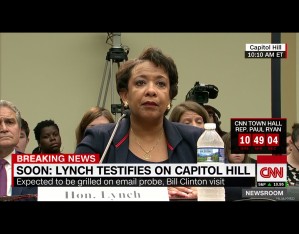 Attorney General Loretta Lynch on Tuesday appeared before the House Judiciary Committee to answer lawmakers questions on a range of issues. Notably, Attorney General Lynch’s testimony marked the first time she has answered questions since she announced the DOJ would not pursue criminal charges against Hillary Clinton for mishandling classified materials. While the Attorney General refused to discuss the specifics surrounding the Clinton investigation, she could not cite any legal reason for why she could not discuss the details.
Attorney General Loretta Lynch on Tuesday appeared before the House Judiciary Committee to answer lawmakers questions on a range of issues. Notably, Attorney General Lynch’s testimony marked the first time she has answered questions since she announced the DOJ would not pursue criminal charges against Hillary Clinton for mishandling classified materials. While the Attorney General refused to discuss the specifics surrounding the Clinton investigation, she could not cite any legal reason for why she could not discuss the details.
Citing Attorney General Lynch’s prior refusal to discuss the details surrounding the Clinton email investigation, Congressman J. Randy Forbes asked if there was a legal prohibition that prevented her from discussing the matter. Specifically, Congressman Forbes asked if any legal prohibitions applied to the Attorney General that did not apply to FBI Director Comey when he testified, providing a great deal of information about the investigation.
WATCH:
The Attorney General replied, “ Thank you for the opportunity to speak to that. I think it’s important to note that the Director and I had different roles in the investigation, and therefore, very different amounts of information about the investigation. I am speaking about the information that I received, which again, as I noted was the team recommendation. Director Comey was speaking from his position as someone who was…”
Sensing Attorney General Lynch was not going to answer the question, Congressman Forbes interrupted and tried to ask the question again.
“I understand you may have different information,” Congressman Forbes said. “My question is, ‘Are there any legal prohibitions on you that Director Comey did not have?’”
“Well, as I’ve indicated, it would not be appropriate in my role to discuss the specific facts and the law…. We typically, actually do not provide the level of detail that the Director Comey did. He chose to provide that level of information…,” Attorney General Lynch replied before she was cut off again by the congressman.
“Is there any legal prohibition or was that just a choice that you made in not disclosing that information?” Congressman Forbes asked.
The Attorney General continued to try to avoid directly answering the question by stammering on about situations that did not apply to the Clinton case that prosecutors are not allowed to discuss, including grand jury investigations.
Undeterred by the Attorney General’s artful dodges, the congressman tried again.
“I’m not talking about grand juror information here,” Forbes said. “What I want to know … tell me, is there a legal reason that prohibits you from giving us information or is that a choice you have made?”
The Attorney General continued to dodge answering the question, despite Congressman Forbes patiently repeating the question one more time. After failing to receive a direct answer, despite asking the question five times, the congressman gave up and moved on to another topic before his five minute time limit expired.
“Let the record say there is no legal prohibition that can be cited here,” Congressman Forbes concluded.
Have a tip we should know? [email protected]